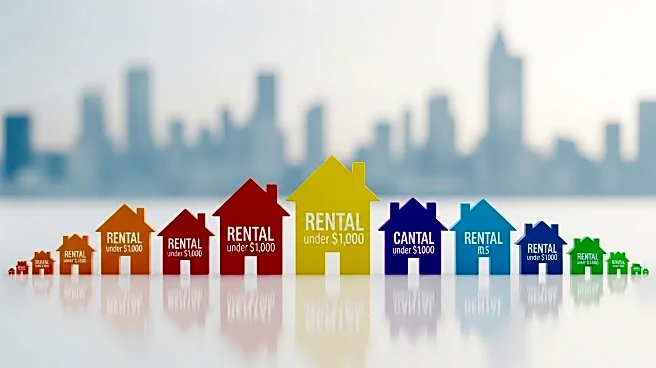What's Happening?
Zillow's recent analysis has identified 13 metropolitan areas in the United States where more than one-third of apartments are renting for less than $1,000. This comes amidst rising home prices and rental costs, which have made it increasingly difficult for Americans to save for homeownership. Wichita, Kansas, leads the list with 54% of its apartment listings priced under $1,000, followed by McAllen, Texas, at 50.6%. Other cities with significant shares of affordable rentals include Little Rock, Arkansas, Toledo, Ohio, and Oklahoma City, Oklahoma. Conversely, cities like Boston, Miami, and Washington, D.C., have less than 1.7% of listings under $1,000. The analysis highlights the concentration of affordable rentals in the Midwest and South, regions known for their lower housing costs.
Why It's Important?
The identification of cities with affordable rental options is crucial as it provides insights into housing affordability across the U.S. With the average rent for all bedrooms and property types now at $2,023, finding affordable housing is a significant challenge for many Americans. The availability of lower-cost rentals can help renters save more effectively for homeownership, potentially reducing the time needed to accumulate a down payment. This information is particularly valuable for individuals and families seeking to relocate to areas with lower living costs, as well as policymakers aiming to address housing affordability issues.
What's Next?
As rental prices continue to rise, cities with affordable housing options may see increased demand from renters looking to save money. This could lead to shifts in population dynamics, with more people moving to the Midwest and South where housing is cheaper. Additionally, policymakers in cities with high rental costs may face pressure to implement measures that increase housing affordability, such as rent control or incentives for affordable housing development.
Beyond the Headlines
The broader implications of this analysis suggest potential shifts in economic and social landscapes. Affordable housing can attract businesses and workers, fostering economic growth in regions with lower living costs. Moreover, the disparity in rental prices across different cities may exacerbate economic inequality, prompting discussions on housing policy reform at local and national levels.








